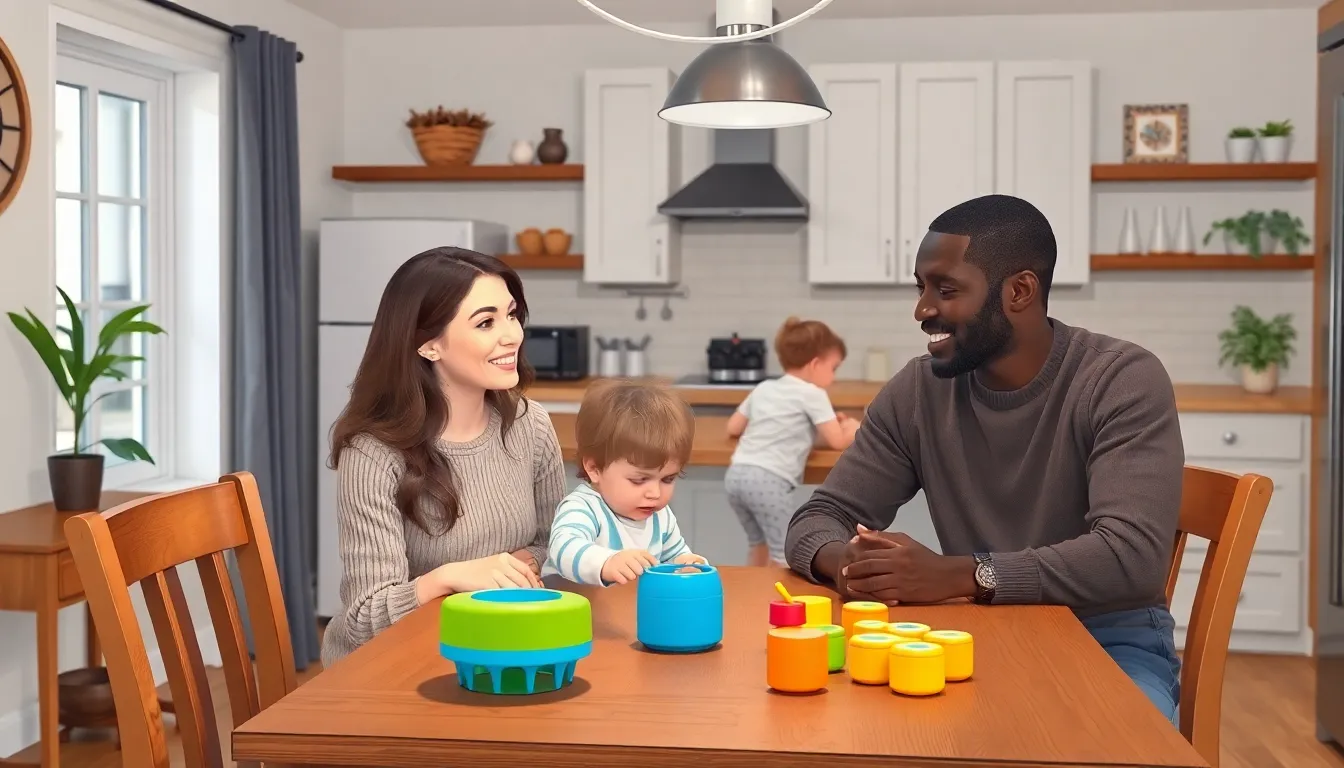Table of Contents
ToggleDivorce can feel like a tornado ripping through a peaceful town, leaving chaos in its wake. But when kids are involved, the aftermath takes on a whole new level of complexity. Enter co-parenting, the art of navigating parenting duties with an ex while trying not to trip over emotional landmines. It’s like trying to dance the tango with someone who just wants to do the cha-cha!
Understanding Co Parenting After Divorce
Co-parenting after divorce involves shared parenting responsibilities between two separated parents. This arrangement can lead to better outcomes for children when managed effectively.
Definition of Co Parenting
Co-parenting refers to the collaborative approach parents take in raising their children after separation. It involves both parents participating actively in decision-making and daily activities related to their children’s lives. This arrangement emphasizes communication and respect, allowing both parents to contribute equally. Parents share responsibilities while creating a nurturing environment for their children. Changing circumstances can prompt adjustments, yet maintaining collaboration remains essential.
Importance of Co Parenting
Co-parenting plays a vital role in children’s emotional and psychological well-being. Children benefit from a stable relationship with both parents, helping them maintain a sense of security. Separate environments can still foster shared experiences, from school events to family celebrations. Healthy communication between parents minimizes conflict and models effective problem-solving skills for children. Research shows that children in cooperative co-parenting arrangements tend to perform better academically and socially. Prioritizing their needs strengthens the family’s support system despite the separation.
Challenges of Co Parenting After Divorce

Co-parenting after divorce presents various challenges. Communication barriers and emotional strain are two significant hurdles that parents often face.
Communication Barriers
Communication barriers frequently arise during co-parenting. Differences in parenting styles can create misunderstandings. Parents might struggle with effectively conveying their needs and expectations, leading to confusion. Misinterpretations often stem from previous conflicts or unresolved feelings, which complicate discussions about the children’s welfare. Utilizing structured communication tools, such as co-parenting apps, can enhance clarity. Establishing regular check-ins also fosters open dialogue. Respectful communication promotes a healthier co-parenting dynamic.
Emotional Strain
Emotional strain impacts parents and children during co-parenting. Feelings of anger, resentment, or sadness can surface, affecting interactions. Parents might find it challenging to manage these emotions while prioritizing their children’s needs. Navigating shared parenting responsibilities can spark conflicts, exacerbating stress levels. Coparenting classes or counseling can help parents develop coping strategies and improve emotional regulation. Establishing support networks can provide relief and aid in managing the emotional landscape. Developing a positive mindset towards co-parenting benefits overall family dynamics.
Effective Strategies for Co Parenting
Successful co-parenting relies on clear strategies. Establishing boundaries and maintaining communication are critical.
Establishing Clear Boundaries
Clear boundaries define parenting roles and responsibilities. Parents should agree on aspects like scheduling, discipline, and decision-making. Each parent must respect these limits to ensure consistency for the children. For instance, if one parent manages extracurricular activities, the other shouldn’t interfere unless necessary. Establishing physical boundaries, such as personal space during exchanges, also aids in minimizing conflict. Parents gain stability in the co-parenting relationship when they set and uphold these boundaries. Clarity fosters a secure environment, helping children adjust better during and after the divorce.
Maintaining Open Communication
Open communication remains vital for effective co-parenting. Setting regular check-ins allows both parents to discuss children’s needs and important updates. Utilizing co-parenting apps streamlines information sharing, reducing misunderstandings. Parents benefit from clearly expressing feelings, whether positive or negative. Explaining decisions regarding the children promotes understanding and cooperation. In challenging situations, active listening can de-escalate potential conflict. Frequent, respectful dialogues illustrate to children that both parents work together for their well-being. When communication flows smoothly, everyone involved experiences less stress, fostering healthier family dynamics.
Legal Considerations in Co Parenting
Navigating co-parenting involves several legal aspects crucial for effective collaboration and child welfare. Understanding these legalities can foster better co-parenting relationships.
Custody Agreements
Custody agreements outline the responsibilities and rights of each parent regarding their children. Written agreements clarify physical and legal custody arrangements, ensuring both parents understand their roles. Factors like each parent’s living situation, work schedules, and children’s needs play significant roles in establishing these agreements. Courts often prioritize the child’s best interests when determining custody, emphasizing stability and safety. Modifying existing custody arrangements can happen as circumstances change, ensuring the agreement remains relevant.
Modifications and Support
Modifications to custody agreements can occur due to significant life changes. Parents who experience job relocations or changes in health might seek adjustments in their arrangements. Courts typically require proof of changes affecting the child’s welfare when processing modification requests. Support systems, including therapists or co-parenting counselors, can facilitate discussions during these transitions. These professionals can guide parents in adapting their co-parenting plans effectively. Seeking legal advice ensures compliance with state laws and requirements, reinforcing the importance of legal support throughout the co-parenting journey.
Co-parenting after divorce can be a challenging journey but it’s essential for the well-being of children. By fostering effective communication and setting clear boundaries, parents can create a stable environment that supports their kids’ emotional needs. Embracing a collaborative approach not only eases the transition for everyone involved but also helps children thrive academically and socially.
Navigating this new dynamic may require patience and effort but the positive outcomes are worth it. With the right strategies in place and a commitment to mutual respect, co-parents can build a healthier relationship that ultimately benefits their children. Prioritizing the child’s best interests while managing personal emotions remains key to successful co-parenting.







